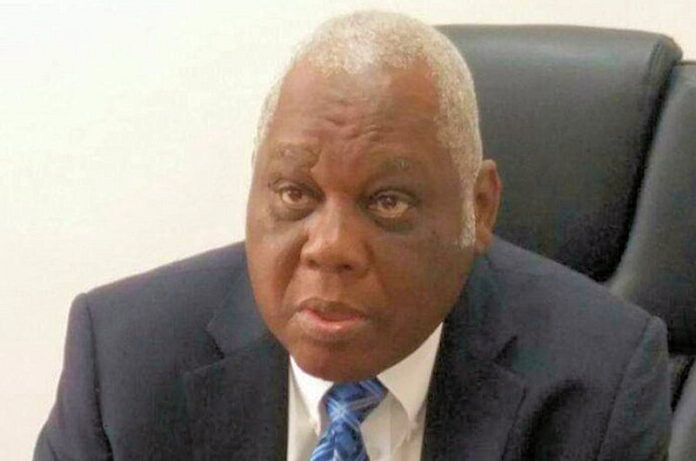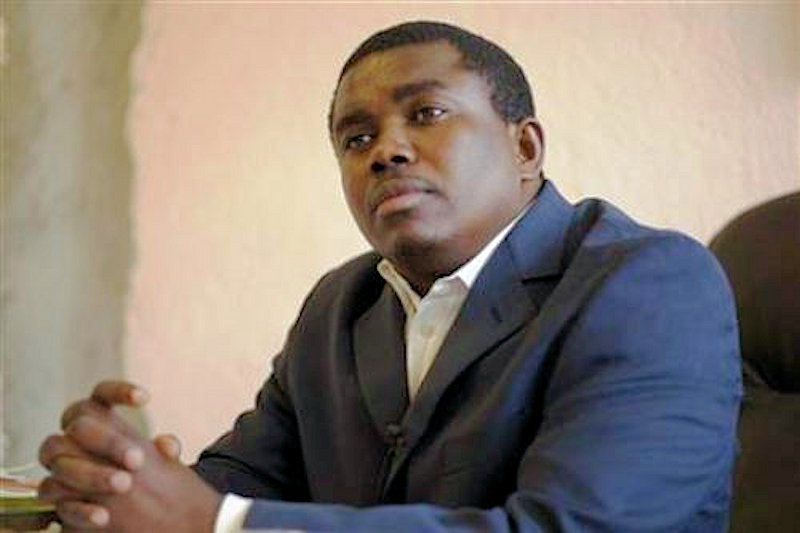
“I accept the choice of the opposition and of civil society to be able to serve my country as provisional President of the transition and the rupture.”
In this little sentence posted on social networks on Sun., Feb. 7, 2021, the people of Haiti and its diaspora learned that judge Joseph Mécène Jean-Louis, 72, a member of the Supreme Court, had become “President” of the Republic. Someone not familiar with Haitian politics would have thought that Haitians, without bloodshed, revolt, or “dechoukaj” (uprooting) had calmly replaced the head of state who had been in office since Feb. 7, 2017.
In order to give some credibility to this surreal development and confirm the peaceful transfer of power to the transition team, a dispatch from Agence France Presse (AFP) reported the following statement by lawyer André Michel, one of the organizers of this affair: “We are waiting for Jovenel Moïse to leave the National Palace so that we can proceed with the installation of Joseph Mécène Jean-Louis.”
Suddenly, Haiti had become a normal country. For the first time in its tumultuous 217 year history, a political changing of the guard was a mere formality. Other peoples around the world were ready to take as a model this Caribbean nation where, for more than 35 years, there has been a never-ending “transition.” Finally, this time, we got it right. The politicians and civil society had finally buried the hatchet in order to allow the country to return to political stability and socioeconomic health.
The rest of the world was about to congratulate the Haitian people for their political maturity and intelligence. Countries that are “friends” of Haiti were proofreading press releases saluting this peaceful transfer of power, this great step towards democracy, when suddenly those responsible for the “Haiti desk” in different Foreign Ministries around the world became aware of another another declaration on the same Sun., Feb. 7, 2021. This one came from Jovenel Moïse.

“My Administration has received from the Haitian people a constitutional mandate of 60 months,” it read. “We have served 48. The next 12 months will be devoted to reforming the energy sector, carrying out a referendum, and organizing elections. To mark the fourth anniversary of my five-year term – which ends on Feb. 7, 2022 – I will address the Nation, this Sunday at 3 a.m. on Facebook and on several other online platforms, to present the Haitian people with the results of Year IV of my administration.”
With this assertion by the occupant of the National Palace that he had no intention of leaving, the fantasy world collapsed. The whole story was just a fable, a bad joke? There would be no installation of a new president in the National Palace? And Jean Louis Mécène then! Who is he? A joker? Where is he ? Are there two Presidents of the Republic of Haiti? Is the farce continuing or what? These are the kind of questions facing the country since Feb. 7, 2021. So far, nobody is in a position to answer any of these questions. Even those who appointed Joseph Mécène Jean-Louis as “President” do not seem capable of enlightening the population on where the process goes from here. And this leads us to the only question that really matters. Was this operation thought out and prepared? Did the opposition sincerely believe that this stunt would succeed? Or was this simply a communications gimmick aimed at shining a spotlight on Feb. 7, 2021?
Nobody can seriously imagine that Jovenel Moïse’s political adversaries had the same game-plan as President Aristide’s opposition in 2001. Jean-Bertrand Aristide clearly, legally, and overwhelmingly won the Nov. 26, 2000 presidential election, which the opposition largely boycotted. Then their initial strategy to try to force him from office, which he assumed on Feb. 7, 2001, was to appoint a “phantom President,” the lawyer Gérard Gourgue, who had been a leading candidate in the aborted November 1987 presidential elections.
It has now been three months since judge Joseph Mécène Jean-Louis was appointed “President” of the Transition. Since that date, apart from a few relatives of his “Excellency,” no one has met him at his home or in a building serving as his “Palace” while awaiting his installation which, according to some officials endorsing his “presidency,” is imminent.
Worse yet, the Haitian people are looking for his motorcade speeding through the streets of the capital on the way to his presidential office or returning home after a long day of hard work spent finding solutions to the many ills making the Republic unstable, uncertain, and ungovernable. But “President” Joseph Mécène Jean-Louis is nowhere to be found since his destiny changed on Feb. 7, 2021. It’s complete radio silence.
Some say that he is hiding in the Artibonite (where he is from) just to protect himself from the henchmen and bloodhounds of Jovenel’s ANI (National Intelligence Agency), who are looking for him everywhere in order to deliver him, bound hand and foot, to the one he wanted to replace.
Others say he is suffering from a disease which prevents him from appearing before the people who would have liked to at least hear him explain how he intends to go about solving the “matter” of Jovenel Moïse. But, having become “President” of the Republic, the words of the former Supreme Court justice are rare, if not completely censored by the “king”-makers of the Democratic and Popular Sector (SDP), as André Michel’s opposition front is called.
While Jovenel Moïse has delivered a flood of speeches, threats, announcements, and declarations, Joseph Mécène Jean-Louis has not even responded. A few people who live on the Internet might have seen a sort of declaration in mid-February stating that “President” Jean-Louis was going to announce some big steps he plans to take for the country as soon as possible. But since then, nothing.
Joseph Mécène Jean-Louis no longer gives any sign of life. Walled up in his silence, he leaves the field open to Jovenel Moïse to continue to preside over the country. He makes no symbolic tours, no political attacks on Jovenel, no public statements or condemnation of kidnapping or the acts of armed gangs, like that in the “Village of God,” which foil incursion after incursion of the national police’s specialized brigades. Not even a word for the families of the five police officers brutally murdered by Izo’s Five Seconds gang on Mar. 12, 2021. He is no doubt paralyzed and stunned by Jovenel Moïse’s decision to fire him along with two of his colleagues, Yvickel Dabrésil and Wendell Coq Thélot, all of them considered for the post of transitional “president” by the opposition. In short, the “President” of the transition does not exist. At least, not for Haiti.
In 2001, the naming of Gérard Gourge as a “parallel president” was a silly move by the opposition’s Democratic Convergence front and later Andy Apaid, Jr.’s “Group of 184″ civil society front, concocted by Washington’s National Endowment for Democracy. After U.S. Special Forces kidnapped President Jean-Bertrand Aristide on Feb. 29, 2004, Gourgue was kicked aside in favor of de facto President Boniface Alexandre and de facto Prime Minister Gérard Latortue, Washington’s choices. Until his death a few months ago, Gérard Gourgue had not fully recovered from this political manipulation. He had been a great law professor and, at one point, a staunch defender of human rights.
Today, three months after his appointment, Joseph Mécène Jean-Louis has still not appointed his Prime Minister, let alone the transitional government outlined in the “Terrace Garden Agreement,” signed by almost all of the opposition’s political parties a few hours before Jean-Louis’ appointment. With no known office, cabinet, or policies, the “President” of the transition is the victim of a fratricidal war within the opposition. According to sources close to various opposition sectors, Jean-Louis is totally isolated, almost a prisoner, and has virtually no contact with the outside world or any opposition leader. Worst of all, no opposition leaders seek to meet him, except, of course, those who got him into this mess that he doesn’t know how to get out of.
Joseph Mécène Jean-Louis no longer gives any sign of life.
According to some leaders of the most moderate opposition parties, from the start of this farce, they have taken their distance from the appointment of judge Joseph Mécène Jean-Louis. Judge Wendell Coq Thélot had always been the favorite choice of most opposition sectors, and they almost unanimously agreed to appoint her as the transitional president. But André Michel quite simply overrode the other opposition leaders, thereby further complicating the fight against Jovenel Moïse.
According to these moderates, there were, in fact, three Supreme Court judges on the list of candidates: Wendell Coq Thélot, Yvickel Dabrésil, and Joseph Mécène Jean-Louis.
But, everyone knew that it was a choice between Wendell Coq Thélot, who was the favorite, and Yvickel Dabrésil. Joseph Mécène Jean-Louis was just there to have a quorum, they say.
Judge Yvickel Dabrésil got sidetracked with another group more eager to go on an adventure and therefore disqualified himself. There were finally two magistrates in the running: Madame Wendell Coq Thélot and Monsieur Joseph Mécène Jean-Louis. André Michel and the SDP team had no control over Coq Thélot and preferred to precipitate events by organizing, without the consent of other members, the famous “Terrasse Garden Accord,” which broadcast on social networks on Feb. 7, 2021 the unrecognizable Joseph Mécène Jean-Louis, who seemed tired, sick, and almost senile, according to some opposition officials.
The opposition’s majority publicly went along with André Michel’s power play so as not to weaken the opposition even more and provide ammunition to Jovenel’s camp and the “international community” supporting him, i.e. the U.S., France, and Canada. They pretend to support Jean-Louis but stay far away from this “President.” Hence their silence on the matter and their low opinion of the man, who has become more than cumbersome for the cause.
In any case, since the appointment of “President” Joseph Mécène Jean-Louis, the least we can say is that neither his personality nor his charisma play in his favor nor that of the entire opposition, which, in desperation, is still waiting for the right moment to install him in the National Palace.









